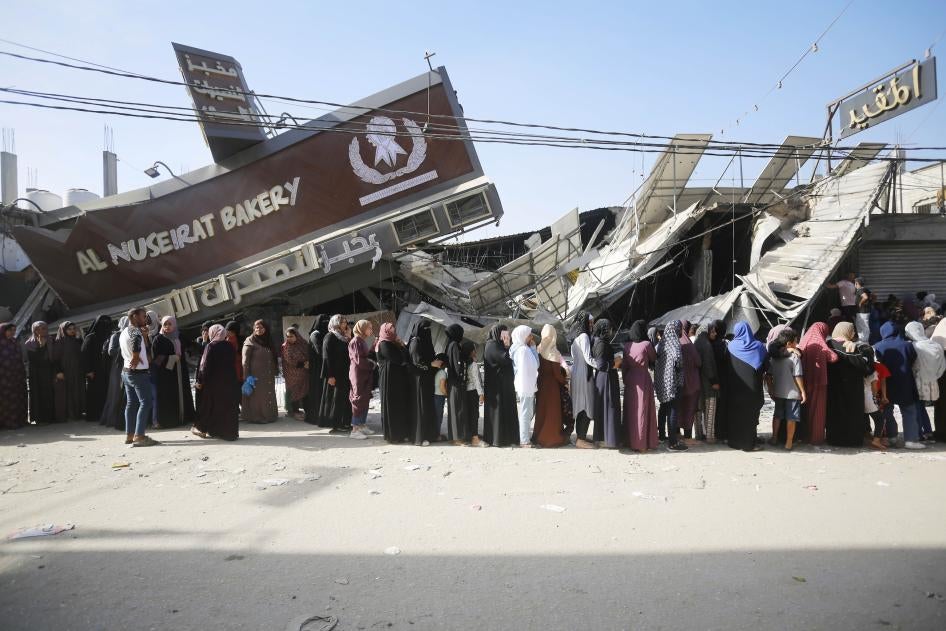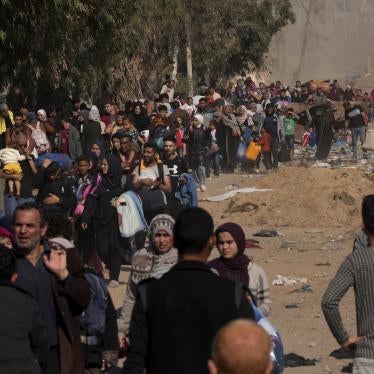(New York) – Governments should continue funding the United Nations Relief and Works Agency for Palestine Refugees in the Near East (UNRWA), given its vital role in averting a humanitarian catastrophe and the risk of famine in the Gaza Strip, while the agency investigates allegations that 12 of its staff were involved in the Hamas-led October 7, 2023, attacks in southern Israel, Human Rights Watch said today.
UNRWA, the largest relief organization in Gaza, has cautioned that, unless funding is resumed, it “will not be able to continue” operations in Gaza, the West Bank, or the three other countries in the region it operates in “beyond the end of February.” After Israeli authorities provided UNRWA with information about the alleged involvement of several of its employees in the October 7 attacks, UNRWA announced that it had “immediately terminated” the contracts of the employees identified and opened an investigation to “establish the truth without delay.” The UN Secretary-General later confirmed the independence of the UN inquiry into the allegations, noting that the UN Office of Internal Oversight Services (OIOS) was immediately activated.
“The allegations against UNRWA staff are serious and the UN appears to be addressing them seriously. But withholding funds from the UN agency most able to provide immediate lifesaving food, water, and medicine to the more than 2.3 million people of Gaza shows callous indifference to what the world’s leading experts have warned is the looming risk of famine,” said Akshaya Kumar, crisis advocacy director at Human Rights Watch. “Palestinian civilians in Gaza, including children, people with disabilities, and those who are pregnant, rely heavily on UNRWA services and have nothing to do with the allegations against individual employees.”
As of January 31, 2024, 18 governments, whose contributions have historically accounted for over three quarters of the agency budget, had frozen their contributions in response to the allegations. Over 1 million displaced Palestinians in Gaza are taking shelter in or around the agency’s shelters amid the current hostilities, and a large number rely on the agency for vital humanitarian aid.
Australia, Austria, Canada, Estonia, Finland, Germany, Iceland, Italy, Japan, Latvia, Lithuania, Netherlands, New Zealand, Romania, Sweden, Switzerland, the United Kingdom, and the United States announced that they are indefinitely pausing payments to UNRWA in response to the allegations that a dozen agency staff members were involved in the October 7 attacks. By contrast, the governments of Belgium, Ireland, Luxembourg, Slovenia, Spain, and Norway rightly issued statements confirming their continued financial support to UNRWA, while also underlining the importance of an investigation into the allegations.
Instead of withholding critical funds, the European Union and France issued statements clarifying that they intend to “review the matter in light of the outcome of the investigation announced by the UN and the actions it will take” and “decide when the time comes.” Contributions by governments to UNRWA are voluntary and discretionary, Human Rights Watch said.
On October 7, Hamas-led gunmen from the Gaza Strip carried out an attack in southern Israel, deliberately killing civilians, firing into crowds, gunning people down in their homes, and taking hostages back to Gaza, including older people and children, acts that amount to war crimes. According to Israeli authorities, more than 1,200 people, most of them civilians, have been killed since October 7, and 136 remained hostages as of January 30.
Shortly after the October 7 attack, Israeli authorities cut off essential services, including water and electricity, to Gaza’s population and blocked the entry of all but a trickle of fuel and critical humanitarian aid, acts of collective punishment that amount to war crimes. Human Rights Watch has also found that Israeli authorities are using starvation as a weapon of war in Gaza. They are doing so by deliberately blocking the delivery of water, food, and fuel, willfully impeding humanitarian assistance, apparently razing agricultural areas, and depriving the civilian population of objects indispensable to their survival under a policy set out by Israeli officials and carried out by Israeli forces.
Israeli air strikes have incessantly pounded Gaza, hitting schools and hospitals, reducing large parts of neighborhoods to rubble, leaving 60 percent of Gaza’s housing units destroyed or damaged, including in attacks that were apparently unlawful. Israeli authorities also ordered everyone in northern Gaza to leave the area, which has displaced 1.7 million people, the vast majority of Gaza’s population, as of January 30. According to the agency, 152 UNRWA employees have been killed since October 7 and 141 UNRWA facilities damaged in 252 “incidents” related to the conduct of hostilities.
Human Rights Watch has urged Israel’s key allies—including the United States, the United Kingdom, Canada, and Germany—to suspend military assistance and arms sales to Israel so long as its forces commit, with impunity, widespread and serious abuses amounting to war crimes against Palestinian civilians. In contrast to their swift suspension of funding to UNRWA even as an investigation is ongoing, although serious allegations of likely war crimes have been brought to their attention, the US, UK, Canada, and Germany continue to provide arms and military assistance to Israel amid mounting evidence of grave abuses, Human Rights Watch said.
Aid groups have highlighted the vital need for and value of UNRWA’s operations in Gaza. In a joint statement, 21 humanitarian organizations said they were “shocked by the reckless decision to cut a lifeline for an entire population by some of the very countries that had called for aid in Gaza to be stepped up and for humanitarians to be protected while doing their job.” The director-general of the World Health Organization and Doctors Without Borders also echoed calls to donors not to suspend their UNRWA funding.
The Integrated Food Security Phase Classification (IPC), a multi-partner initiative that regularly publishes information on the scale and severity of food insecurity and malnutrition globally, issued a report published at the end of December concluding that the entire population of Gaza is at crisis level of acute food insecurity or worse. The IPC said that virtually all Palestinians in Gaza are skipping meals every day while many adults go hungry so children can eat, and that the population faced famine if current conditions persisted. It added: “this is the highest share of people facing high levels of acute food insecurity that the IPC initiative has ever classified for any given area or country.”
UNRWA was created by the UN General Assembly in 1949 to serve Palestinian refugees. It has 30,000 employees and provides direct humanitarian assistance, human development, and protection programming for more than 5.9 million Palestinian refugees registered with the agency and living in the Gaza Strip, the West Bank, including East Jerusalem, as well as Syria, Lebanon, and Jordan. More than half of the agency’s regular budget is devoted to education. The agency is also sheltering over 1 million displaced Palestinians in 150 facilities within Gaza, including its schools. At least 357 people sheltering within the agency’s premises have been killed and 1,255 have been injured since October 7.
Some Israeli officials and members of the US Congress have referenced the recent allegations in order to further a longstanding campaign against UNRWA. In the wake of the most recent allegations being made public, Israel’s Foreign Minister, Israel Katz, highlighted on January 27 his government’s longstanding opposition to UNRWA, claiming among other things that the UN agency “perpetuates the refugee issue,” and disclosed that “under his leadership,” the Israeli government intends to “work to garner bipartisan support in the US, the European Union, and other nations globally for this policy aimed at halting UNRWA’s activities in Gaza.”
According to the Principals of the Inter-Agency Standing Committee, “no other entity has the capacity to deliver the scale and breadth of assistance that 2.2 million people in Gaza urgently need.” Janti Soeripto, president and CEO of Save the Children, called it “magical thinking" for governments to think other aid groups can replace UNRWA in Gaza. The head of the Norwegian Refugee Council has said that other humanitarian groups combined “are not even close to being what UNRWA is for the people of Gaza.”
As the occupying power, Israel is obliged to ensure that the humanitarian needs of the population of Gaza are met. The International Court of Justice (ICJ) ordered provisional measures on January 26 as part of South Africa’s case against Israel alleging violations of the Genocide Convention. The court adopted binding orders that include requiring Israel to take immediate and effective measures to enable the provision of urgently needed basic services and humanitarian assistance to address the adverse conditions of life faced by Palestinians in the Gaza Strip. The court ordered Israel to report back on its compliance with the orders in one month.
“Despite mounting risks of famine and a binding order by the World Court in a case about genocide, Israel’s foreign minister has now announced that he will lead a brazen effort to shut down the UN agency most responsible for delivering lifesaving aid,” Kumar said. “Unless governments reverse their decisions to suspend aid to UNRWA, the main humanitarian channel into Gaza, they risk contributing to the current catastrophe.”









